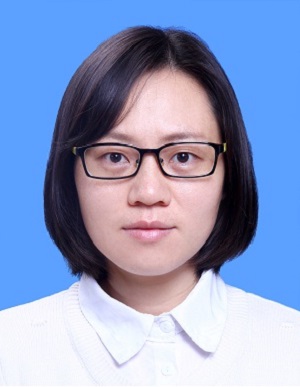
Hongxia Duan, Ph.D, Associate Professor
-
Member of the Youth Innovation Promotion Association of CAS
Laboratory of Protein and Peptide Drugs, IBP
Research Interests: Tumor immunology
Email: cherryshoen@aliyun.com
Tel: 010-64888503
Address: 15 Datun Road, Chaoyang District, Beijing, 100101, China
Chinese personal homepage
- Biography
2002 - 2007 Wuhan University of Science and Technology, Bachelor of Medicine
2007 - 2009 HuaZhong University of Science and Technology, Master of Medicine
2009 - 2013 University of Chinese Academy of Sciences, Ph.D
2013 - 2016 Institute of Biophysics, CAS, post-doctor
2017 - Institute of Biophysics, CAS, Associate professor
- Awards
- Membership in Academies & Societies
- Research Interests
It has been well recognized that there is a close relationship between chronic non-resolving inflammation and malignant transformation. However, the molecular mechanism of this process is not clear. In the past three years, we have been focusing on cancer-related inflammation, angiogenesis and metastasis. Our study provided important evidence that CD146, as a node molecule, links chronic non-resolving inflammation and malignant transformation. Based on the established the endogenous molecular–cellular network of CD146+ immune cells, we will predict the candidate molecules in controlling the function conversion of CD146+ immune cells, including the crosstalk with other immune cells, stromal cells and liver cells. Collectively, our study will provide a novel marker for functional switch of tumor-associateimmune cells during HCC initiation. Our study will also provide a new treatment strategy for HCC.
- Grants
- Selected Publications
1. Xue B, Wang P, Yu W, Feng J, Li J, Zhao R, Yang Z*, Yan X*, Duan H*. CD146 as a promising therapeutic target for retinal and choroidal neovascularization diseases. Sci China Life Sci. 2021, Oct 29. doi: 10.1007/s11427-021-2020-0. Online ahead of print.
2. Duan H#, Jing L#, Jiang X, Ma Y, Wang D, Xiang J, Chen X, Wu Z, Yan H, Jia J, Liu Z, Feng J, Zhu M*, Yan X*. CD146 bound to LCK promotes TCR signaling and anti-tumor immune response in mice. J Clin Invest. 2021, Nov 1;131(21):e148568. doi: 10.1172/JCI148568.
3. Chen X#, Yan H#, Liu D, Xu Q, Duan H, Feng J*, Yan X*, Xie C*. Structure basis for AA98 inhibition on the activation of endothelial cells mediated by CD146. iScience. 2021, Apr 14;24(5):102417. doi:10.1016/j.isci.2021.102417. eCollection 2021 May 21
4. Hongxia Duan#*, Shuai Zhao#, Jianquan Xiang#, Chenhui Ju, Xuehui Chen, Irene Gramaglia and Xiyun Yan*. Targeting the CD146/Galectin-9 axis protects the integrity of the blood-brain barrier against experimental cerebral malaria. Cell Mol Immunol. 2021, Oct;18(10):2443-2454. doi: 10.1038/s41423-020-00582-8. Epub 2020 Nov 17.
5. Daji Wang#, Hongxia Duan#, Jing Feng, Jianquan Xiang, Liqun Feng, Dan Liu, Xuehui Chen, Lin Jing, Zheng Liu, Dexi Zhang, Hongjun Hao, Xiyun Yan. Soluble CD146, a cerebrospinal fluid marker for neuroinflammation, promotes blood-brain barrier dysfunction. (#Co-first author) Theranostics. 2020, Vol. 10, Issue 1.
6. Shuai Zhao, Hongxia Duan, Yili Yang, Xiyun Yan*, Kelong Fan*. Fenozyme Protects the Integrity of the Blood–Brain Barrier against Experimental Cerebral Malaria. Nano Lett. 2019.
7. Yongting Luo#, Hongxia Duan#, Yining Qian#, Liqun Feng, Zhenzhen Wu, Jing Feng, Dongling Yang, Zhihai Qin, Xiyun Yan. Macrophage CD146 promotes atherosclerosis by trapping macrophages in the plaques. (#Co-first author) Cell Res. 2017, Mar;27(3):352-372
8. Duan H, Xing S, Luo Y, Feng L, Gramaglia I, Zhang Y, Lu D, Zeng Q, Fan K, Feng J, Yang D, Qin Z, Couraud PO, Romero IA, Weksler B, Yan X. Targeting endothelial CD146 attenuates neuroinflammation by limiting lymphocyte extravasation to the CNS. Sci Rep. 2013, 3:1687.
9. Duan H, Luo Y, Hao H, Feng L, Zhang Y, Lu D, Xing S, Feng J, Yang D, Song L, Yan X. Soluble CD146 in cerebrospinal fluid of active multiple sclerosis. Neuroscience. 2013, Apr 3;235:16-26.
10. Jiang T, Zhuang J, Duan H, Luo Y, Zeng Q, Fan K, Yan H, Lu D, Ye Z, Hao J, Feng J, Yang D, Yan X. CD146 is a coreceptor for VEGFR-2 in tumor angiogenesis. Blood. 2012, Sep 13;120(11):2330-9.
11. Zeng Q, Li W, Lu D, Wu Z, Duan H, Luo Y, Feng J, Yang D, Fu L, Yan X. CD146, an epithelial-mesenchymal transition inducer, is associated with triple-negative breast cancer.Proc Natl Acad Sci U S A. 2012, Jan 24;109(4):1127-32.
12. Qian YN, Luo Y, Duan HX, Feng LQ, Bi Q, Wang YJ, Yan XY. Adhesion Molecule CD146 and its Soluble Form Correlate Well with Carotid Atherosclerosis and Plaque Instability. CNS Neurosci Ther. 2014, 20(5):438-45.
13. Shu Xing, Luo Y, Zhihua Liu, Pengcheng Bu, Hongxia Duan, Dan Liu, Ping Wang, Jing Yang, Lina Song, Jing Feng, Dongling Yang, Zhihai Qin, Xiyun Yan. Targeting endothelial CD146 attenuates colitis and prevents colitis-associated-carcinogenesis. Am J Pathol. 2014, 184:1604-16.
14. Wang P, Luo Y, Duan H, Xing S, Zhang J, Lu D, Feng J, Yang D, Song L, Yan X. MicroRNA-329 suppresses angiogenesis by targeting CD146. Mol Cell Biol. 2013, 33(18):3689-99.
15. Zeng Q, Wu Z, Duan H, Jiang X, Tu T, Lu D, Luo Y, Wang P, Song L, Feng J, Yang D, Yan X. Impaired tumor angiogenesis and VEGF-induced pathway in endothelial CD146 knockout mice. Protein Cell, 2014, 5(6):445-56.
16. Gao Q, Chen X, Duan H, Wang Z, Feng J, Yang D, Song L, Zhou N, Yan X. FXYD6: a novel therapeutic target toward hepatocellular carcinoma. Protein Cell. 2014, Jul;5(7):532-43.
(From Hongxia Duan, November 8, 2021)

